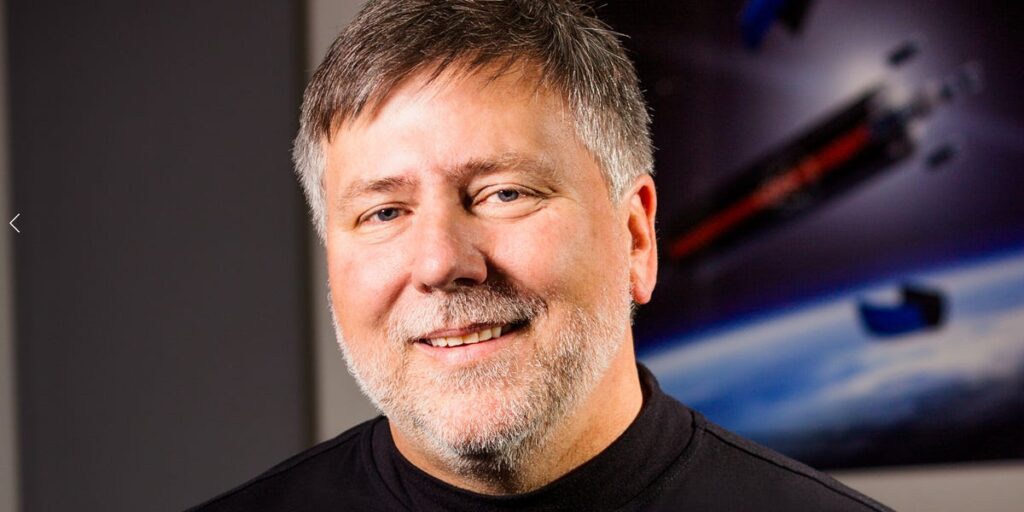- SpaceX compared itself to another space company in its lawsuit against a California agency.
- Phantom Space CEO Jim Cantrell, a longtime colleague of Elon Musk, supports SpaceX.
- ‘It’s very un-American, it’s very anti-competitive,” he said of the commission.
Jim Cantrell, the founder of Phantom Space, said he sides with his longtime colleague Elon Musk in SpaceX’s lawsuit against the California Coastal Commission, telling Business Insider he was “very surprised at how blatantly political” the commission had been.
Musk is suing the commission, accusing it of “unconstitutional overreach,” after members publicly criticized his politics during a meeting and later rejected more frequent SpaceX launches off the California coastline at Vandenberg Space Force Base.
SpaceX was seeking to increase the number of launches each year from 36 to 50.
In its written decision, the commission said that as a private company, SpaceX is not exempt from obtaining a permit, even though it works closely with the federal government.
In its lawsuit, SpaceX accuses the commission of “political biases” and said another commercial space operator similarly conducting a mix of commercial and federal work was recently approved for 60 launches out of Vandenberg.
Cantrell, a member of SpaceX’s founding team and employee number four at the company, told Business Insider that SpaceX is referencing Phantom Space in its suit — and he’s firmly on Musk’s side.
“People who are representing government — whether it’s state government, federal government — really shouldn’t be basing their decisions on who you support for president or anybody else,” Cantrell told BI.
A Finding of No Significant Impact (FONSI) document viewed by Business Insider and signed by a United States Space Force executive in June 2024 showed Phantom was given the all clear for 48 flights annually at Vandenberg.
Cantrell told BI that the company got approval for 12 launches at a separate Space Launch Complex at the base. According to FAA data, only two operators have launched at Vandenberg this year: SpaceX and Firefly.
“It’s very un-American, it’s very anti-competitive, and I don’t like it,” Cantrell said of what he believes is commission bias. “And so I’m aligned with Elon on this, even at the risk of having the California Coastal Commission retaliate against us.”
Cantrell told BI he, unlike Musk, maintains political neutrality. Phantom uses smaller vehicles than SpaceX, which accounts for a smaller environmental impact, he said.
“I very, very succinctly refuse to endorse politicians,” Cantrell said. “You’re either going to piss off half the world and make the other half happy or piss off nobody. So I try to stay neutral.”
The California Coastal Commission declined to comment for this story.
SpaceX’s lawsuit against the commission alleges the group, which regulates the use of land and water in California’s coastal zone, “has engaged in naked political discrimination” in violation of the First and 14th Amendments.
The space rocket company says in the lawsuit that the commission was trying to “unlawfully regulate space launch programs” at Vandenberg military base.
A Vandenberg spokesman declined to comment on the ongoing litigation and said the base is working with state and federal agencies to “ensure safe and effective launch operations conducted under the existing 36-launch agreement.”
Legal experts told BI Musk’s complaint could be successful if the billionaire CEO can prove bias.
“If the facts are as alleged, and if Musk can prove that the decision would have been different had his politics been different or had he been apolitical, then the First Amendment arguments should likely prevail,” Eugene Volokh, a First Amendment scholar, told BI.
Musk “has to show that his politics were a substantial factor” in the commission’s decision, said Volokh, a professor of law at UCLA and senior fellow at the Hoover Institution at Stanford University.
“Then, if he does that, the commission would have to prove that it would have reached the same result regardless of his politics,” Volokh said.
David Driesen, a law professor at Syracuse University, told BI, “Politicians have a First Amendment right to criticize Musk, so accusing him of spreading falsehoods is protected political speech.”
“On the other hand,” Driesen said, “if Musk could show that the decision to deny his application was punishment for his falsehoods, that might make out a First Amendment violation.”
Driesen pointed out that SpaceX’s lawsuit emphasizes an administrative law claim that federal law prohibits the commission from interfering in the company’s launch plan.
“Maybe his lawyers understand that the First Amendment claim is a long shot and want to gin up something else,” Driesen said.
SpaceX did not immediately respond to a request for comment from Business Insider.
Read the full article here


